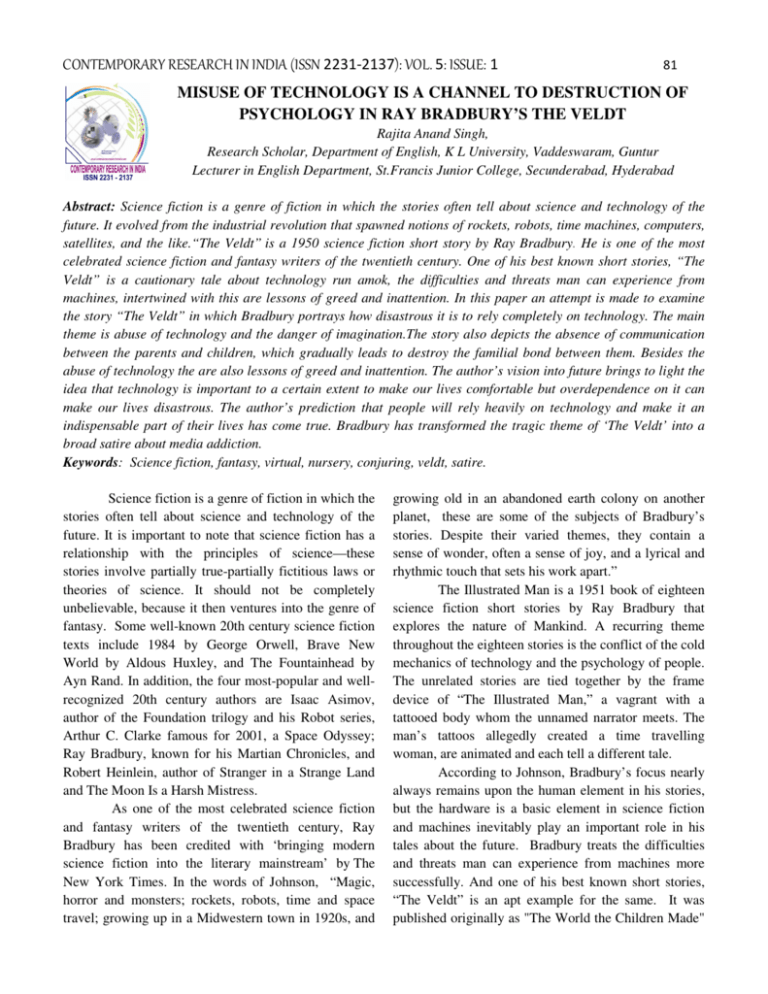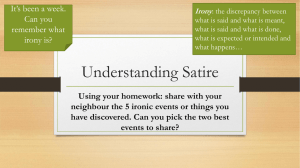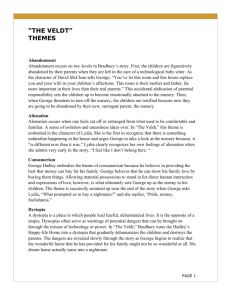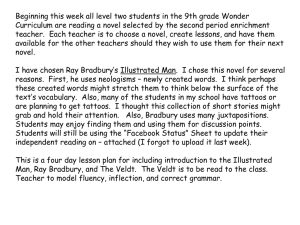contemporary research in india (issn 2231
advertisement

CONTEMPORARY RESEARCH IN INDIA (ISSN 2231-2137): VOL. 5: ISSUE: 1 81 MISUSE OF TECHNOLOGY IS A CHANNEL TO DESTRUCTION OF PSYCHOLOGY IN RAY BRADBURY’S THE VELDT Rajita Anand Singh, Research Scholar, Department of English, K L University, Vaddeswaram, Guntur Lecturer in English Department, St.Francis Junior College, Secunderabad, Hyderabad Abstract: Science fiction is a genre of fiction in which the stories often tell about science and technology of the future. It evolved from the industrial revolution that spawned notions of rockets, robots, time machines, computers, satellites, and the like.“The Veldt” is a 1950 science fiction short story by Ray Bradbury. He is one of the most celebrated science fiction and fantasy writers of the twentieth century. One of his best known short stories, “The Veldt” is a cautionary tale about technology run amok, the difficulties and threats man can experience from machines, intertwined with this are lessons of greed and inattention. In this paper an attempt is made to examine the story “The Veldt” in which Bradbury portrays how disastrous it is to rely completely on technology. The main theme is abuse of technology and the danger of imagination.The story also depicts the absence of communication between the parents and children, which gradually leads to destroy the familial bond between them. Besides the abuse of technology the are also lessons of greed and inattention. The author’s vision into future brings to light the idea that technology is important to a certain extent to make our lives comfortable but overdependence on it can make our lives disastrous. The author’s prediction that people will rely heavily on technology and make it an indispensable part of their lives has come true. Bradbury has transformed the tragic theme of ‘The Veldt’ into a broad satire about media addiction. Keywords: Science fiction, fantasy, virtual, nursery, conjuring, veldt, satire. Science fiction is a genre of fiction in which the stories often tell about science and technology of the future. It is important to note that science fiction has a relationship with the principles of science—these stories involve partially true-partially fictitious laws or theories of science. It should not be completely unbelievable, because it then ventures into the genre of fantasy. Some well-known 20th century science fiction texts include 1984 by George Orwell, Brave New World by Aldous Huxley, and The Fountainhead by Ayn Rand. In addition, the four most-popular and wellrecognized 20th century authors are Isaac Asimov, author of the Foundation trilogy and his Robot series, Arthur C. Clarke famous for 2001, a Space Odyssey; Ray Bradbury, known for his Martian Chronicles, and Robert Heinlein, author of Stranger in a Strange Land and The Moon Is a Harsh Mistress. As one of the most celebrated science fiction and fantasy writers of the twentieth century, Ray Bradbury has been credited with ‘bringing modern science fiction into the literary mainstream’ by The New York Times. In the words of Johnson, “Magic, horror and monsters; rockets, robots, time and space travel; growing up in a Midwestern town in 1920s, and growing old in an abandoned earth colony on another planet, these are some of the subjects of Bradbury’s stories. Despite their varied themes, they contain a sense of wonder, often a sense of joy, and a lyrical and rhythmic touch that sets his work apart.” The Illustrated Man is a 1951 book of eighteen science fiction short stories by Ray Bradbury that explores the nature of Mankind. A recurring theme throughout the eighteen stories is the conflict of the cold mechanics of technology and the psychology of people. The unrelated stories are tied together by the frame device of “The Illustrated Man,” a vagrant with a tattooed body whom the unnamed narrator meets. The man’s tattoos allegedly created a time travelling woman, are animated and each tell a different tale. According to Johnson, Bradbury’s focus nearly always remains upon the human element in his stories, but the hardware is a basic element in science fiction and machines inevitably play an important role in his tales about the future. Bradbury treats the difficulties and threats man can experience from machines more successfully. And one of his best known short stories, “The Veldt” is an apt example for the same. It was published originally as "The World the Children Made" CONTEMPORARY RESEARCH IN INDIA (ISSN 2231-2137): VOL. 5: ISSUE: 1 in the September 23, 1950 issue of The Saturday Evening Post. It is a cautionary tale about technology run amok: it depicts a family’s totally automated house, including a virtual reality nursery that entertains the children by conjuring up the contents of their imaginations. The story begins with the Hadley family which lives in an automated house called "The Happy life Home," filled with machines that do everything for them from cooking meals, to clothing them, to rocking them to sleep. They walked down the hall of their soundproofed Happy life Home, which had cost them thirty thousand dollars installed, this house which clothed and fed and rocked them to sleep and played and sang and was good to them ( Bradbury ,7 ) The two children, Peter and Wendy become fascinated with the "nursery," a virtual reality room that is able to connect with the children telepathically to reproduce any place they imagine. The parents, George and Lydia, soon realize that there is something wrong with their way of life. They are also perplexed and confused that the nursery is stuck on an African setting, with lions in the distance, eating the dead carcass of what they assume to be an animal. There they also find recreations of their personal belongings and hear strangely familiar screams. Wondering why their children are so concerned with this scene of death, they decide to call David Mc Clean the psychologist. After observing the nursery, he tells them that the children live for the nursery and it has conveniently replaced the real parents. He suggests they turn off the house, move to the country, and learn to be more self-sufficient. The children, completely reliant on the nursery, beg their parents to let them have one last visit. The parents relent, and agree to let them spend one more minute there. When they come to the nursery to fetch the children, the latter lock them in from the outside. George and Lydia look on as the lions begin to advance towards them and scream. At that point, they realize that what the lions were eating in the distance was not an animal, but their own simulated remains. When David comes by to look for George and Lydia, he finds the children instead enjoying lunch on the veldt and sees the lions eating something in the distance. The 82 reader realizes that George and Lydia died at the hands of their own offspring, who had so often envisioned the lions eating them that it came true. One of Bradbury’s most famous machines is the children’s electronic playroom in “The Veldt”. The electronic playroom brings the children’s fantasies to living, breathing three dimensional life. When the parents realize that the kids are spending too much time in the playroom, they threaten to pull the plug. But before they can accomplish this, the children conjure up an African veldt, complete with hungry lions, into which the parents are sent on a brief but fatal safari. (Johnson, 80). In “The Veldt”, the name of the children’s room is important to note. It is not called the “playroom” but instead—and perhaps more symbolically—the “Nursery”. The nursery reproduces images of the children’s thoughts, in effect becoming their imagination. One of the original uses of these nurseries was so that we could study the patterns left on the walls by the child's mind, study at our leisure, and help the child” “In this case, however, the room has become a channel toward-destructive thoughts, instead of a release away from them. (Bradbury, 16) In Ray Bradbury’s short story “The Veldt” he portrays how disastrous it is to rely completely on technology. Technology’s offering in this story is the Happy life Home, which mechanically performs almost every human function, including that of the imagination. The house does every little thing for the family resulting in the latter’s complete dependence on it. The parents have bought the house to free themselves of the repetitive and monotonous task, yet for this family that shift of responsibilities also extends to nurturing their children. This is a pointer to the fact that the parents devote very little time to their children. On the other hand the two children fail to perform basic task due to their overdependence on technology. Without the guidance of their parents, the children are left to their own devices, and are guided by an indulgent technology that the parents could never hope to retrieve them from. As a result the house has become more important to children than their parents. Both the CONTEMPORARY RESEARCH IN INDIA (ISSN 2231-2137): VOL. 5: ISSUE: 1 parents fulfill all their wishes and pamper them to such an extent that they eventually lose their control on them. George and Lydia allow the children to exercise freedom (their visit to the carnival), immediately yield to their tantrums, and fail to enforce any rules of conduct for them. The children in fact pay no heed to their parent’s advice and become disobedient, stubborn and revengeful. The parents allow the technology to replace them. The children due to lack of communication and parental guidance misuse technology “the nursery” which becomes a channel of negative thoughts for the children. Rather than charming fairylands, the children create the veldt, where the bloodthirsty lions consume their parents. This is where the children are nurtured. Ultimately the new toy becomes the instrument of their inner rage. (Mogen, 98) The house itself becomes a living presence in the story; it is designed to provide services that should have been left to humans. It’s the children’s favorite “toy”, one with more richness and reliability than their parents exude, and so they become aligned with the Nursery and against their parents. They reach to level where they fail to differentiate between technology and parents.. Stripped of their parenting duties, they have forgotten how to communicate with their children. In every interaction between parents and children, the children receive what they want. These negative interactions emphasize the importance of inter-family communications. Bradbury in this story very effectively brings out the aspect of inattention which the children face due to their parents strong desire to set themselves free of the monotony in their day to day lives. In this story, Bradbury writes a precautionary tale of the advancement in technology and the importance of maintaining communication during these technological advances. In the Hadley's "Happy-life Home," all of their needs and desires are fulfilled by the house. At the outset this turned out to the advantage of the Hadley's and a primary reason for the desirability of the home, but ironically has now become a point of stress rather than happiness. Both parents struggle to find fulfillment in their everyday life because their traditional roles as mother and father have been replaced by the house. The house has now become the 83 parent for the children which feeds, nurtures and entertains them. The children depend on it to such an extent that they have reached a stage where they no longer need their parents as the house takes care of their every little need. In The Veldt, George and Lydia allow their ‘Happy Life Home’ take on their own parenting responsibilities. Through this story the author reveals a frightening idea. He starts to insinuate that the children prefer the house to their parents because it has assumed their roles. Neither parent is involved in any aspect of their lives because the house can do it all. At different points in the story, both parents contemplate going back to a "normal" house even though it would mean extra work and tasks for them every day. Both George and Lydia are facing an identity crisis as parents. Technology has usurped their roles and they are struggling to find means of making their presence felt in the lives of their children. Lydia tells George, "That's just it. I feel like I don’t belong here. The house is wife and mother now, and nursemaid. Can I compete with an African veldt? Can I give a bath and scrub the children as efficiently or quickly as the automatic scrub bath can? I cannot. And it isn’t just me. It’s you. You’ve been awfully nervous lately.(Bradbury, 10). The parents, were lavish and extravagant in providing the children with all the comforts by buying a fully automated house but failed to devote time and give personal care to their children. They have allowed the nursery to usurp their role as parents while becoming the childish dependents of their house. The children view the home as the caregiver, not the parents.. The elder Hadley’s also participate in this dehumanizing process. They too, have refused to grow up, to accept their duties as parents. Their avoidance of responsibility reduces them to the level of prey to lions. You've let this room and this house replace you and your wife in your children'saffections. This room is their mother and father, far more important in their lives than their real parents. (Bradbury, 16) In the story, the parents in the story allowed the children to have their way and did not restrict the time they spent in the nursery. Through this strong impact of the CONTEMPORARY RESEARCH IN INDIA (ISSN 2231-2137): VOL. 5: ISSUE: 1 nursery on the children, that the author brings to light the idea that the parents have lost their control over children as a result they are no more the authority figures but obstacles in their children’s eyes. It also points out the fact that technology can provide us comforts but cannot perform our daily chores, especially take over the role of parenting. Parenting is not merely fulfilling the wishes of children but something much more than that. Besides the fact that technology cannot replace love, affection and parental guidance. The abuse of technology is a frequent theme of Bradbury's and is evident in almost every story in this collection “ The Illustrated Man” in one way or the other - not a surprise, since this is ostensibly a collection of science fiction tales. In the short story as in "The Veldt", technology has taken over too many human roles. Ironically, the technological marvel that was to provide a safe and carefree environment for the Hadley’s creates instead the violent world of the veldt. “The story focuses not on the machine itself, but on the disturbing psychology of the family that has unwittingly enslaved itself to it. (Mogen, 99). At the time the story was written, many American families were acquiring their first television sets, and no one was sure exactly how this new technology would impact the relationships among family members. This fear is directly reflected in "The Veldt," but in the story, Bradbury heightens the odds by creating a machine that not only allows children to detach emotionally from their parents, but one that can also physically destroy the parents, as well. The Veldt,” perhaps Bradbury’s short –story masterpiece on this theme, provides a haunting, complex image of ultimately self destructive over dependence on technological comforts. The title itself eloquently expresses this theme, since the “veldt” refers to the savage center of an immaculate high tech home of the future- the “nursery” where a technological toy designed to enhance children’s playful fantasies instead destroy its owners. (Mogen, 98). In his article on science fiction, “Fantasy, Science Fiction, and the Teaching of Values” James Prothero 84 writes, Bradbury’s story “The Veldt” in The Illustrated Man is about two children addicted to technologically sophisticated room that can reproduce in sight, sound, and smell any place a person can imagine. The room replaces the parents. The story is a chilling fable, kind of exaggerated warning to the sort of parents who might, in an earlier age have let their children watch too much television. Ultimately the Veldt warns not about the danger of technology itself but about the human consequences of substituting technological marvels for basic human needs. Though they apparently murder to preserve their beloved machine after the father decides to shut it down, their deeper motivation stems from parental deprivation; they identify so fiercely with the nursery because the parents substituted it for themselves. In spoiling their children, the parents have actually deprived them of the necessary human contact-just the parents in turn, realize they secretly hate the efficient modern home that satisfies their every desire, yet leaves them feeling depersonalized and useless. (Mogen 98). The story is a satire on the modern consumer society from a traditional, humanistic viewpoint in the style of several other Ray Bradbury works, such as Fahrenheit 451 (1953) and The Martian Chronicles (1950). In all these stories, technology, backed up by commercialism and a utilitarian philosophy, tries to remove the inconveniences, difficulties, and challenges of being human and, in its efforts to improve the human material condition, impoverishes its spiritual condition. Through this story Bradbury warns us about the disastrous consequences of being over dependent on technology. In this technologically driven world, the importance of inter personal communication in families, and parental guidance to children by allowing them to access the gadgets for a moderate time plays a pivotal role. The Veldt is a cautionary tale which reminds us that technology can be a boon to mankind by providing us with all sorts of comforts and make our lives luxurious but can never replace a human. This is what happens with George and Lydia in the story. One should not be too dependent on it that one fails to perform their basic task. Technology should never reach CONTEMPORARY RESEARCH IN INDIA (ISSN 2231-2137): VOL. 5: ISSUE: 1 a stage where people prefer it to human interaction. This is true especially in terms of the role of parenting. To conclude, Bradbury has transformed the tragic theme of the veldt into a broad satire about media 85 addiction. He believed that science and technology should never come at the expense of human life. Bradbury’s short story “The Veldt” clearly demonstrates his belief. Works Cited Bradbury, Ray. “The Illustrated Man”, Bantam Books, New York: 1952. Johnson, L Wayne. “Ray Bradbury”, Frederick Ungar Publishing Co., Inc. U.S.A: 1980. Mogen, David. “Ray Bradbury” Twayne Publishers: 1986. Prothero, James,” Fantasy, Science Fiction, and the Teaching of Values” The English Journal, Vol. 79, No. 3 (Mar., 1990) en.wikipedia.org/wiki/ The Veldt_(short _story)> www.gradesaver.com › Ray Bradbury: Short Stories www.enotes.com/topics/veldt digitalmediast.com/2013/.../the-veldt-there-will-come-soft-rains-analysis/








